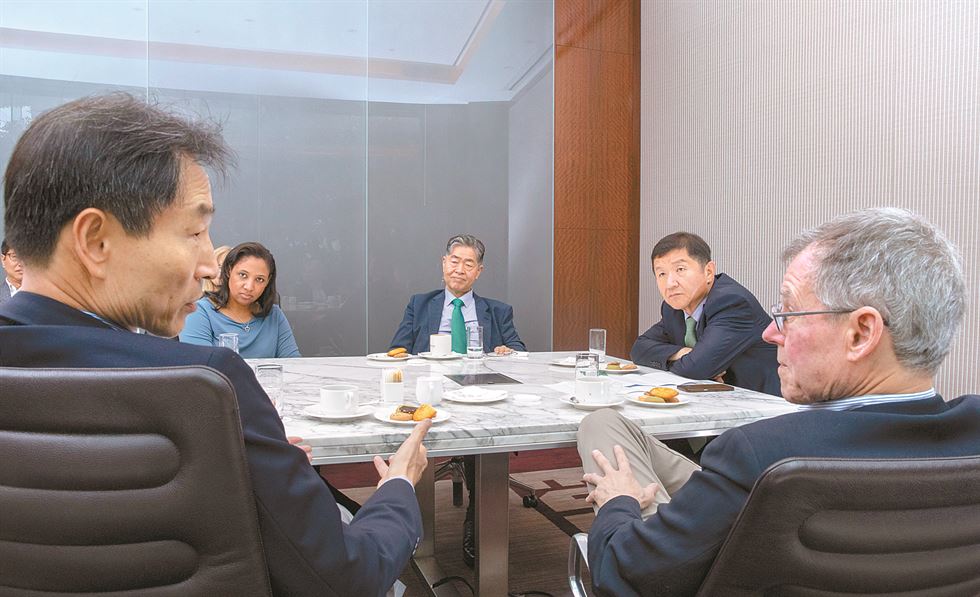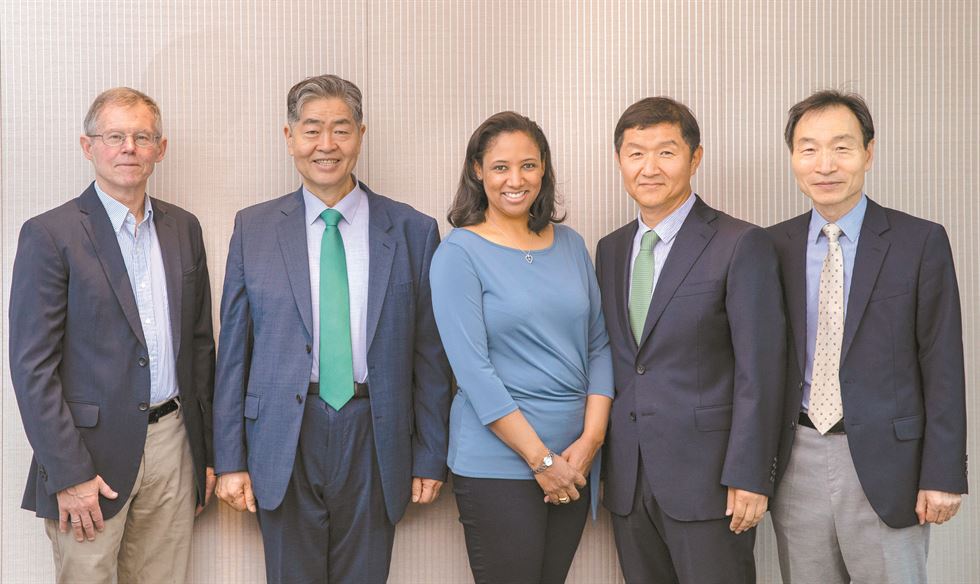- Daesung News
- Read the latest news featuring Daesung Group
| Title | [The Korea Times] Microbes key to solving energy problems | 2019.06.25 |
|---|---|---|
|
FROM: The Korea Times [The Korea Times - June. 25, 2019]
Microbes key to solving energy problems
Younghoon David Kim, center, chairman and CEO of Daesung Group and chairma of the World Energy Council, and other participants discuss future possibilities of using micro biotechnology as a new energy source during The Korea Times roundtable discussion at the Westin Chosun Seoul hotel, June 21. / Korea Times photo by Shim Hyun-chul
By Baek Byung-yeul
"White" biotechnology can provide an alternative to fossil fuels and lower carbon emissions, amid growing public concerns about global warming and other environmental challenges, according to the chairman of Daesung Group.
Younghoon David Kim, who heads the mid-tier energy conglomerate, said white biotechnology, which refers to using microbial cells and their enzymes to produce eco-friendly chemical products, biofuels, pharmaceutical products, foods and other materials, has emerged as a key to address environmental issues.
On June 21, Kim and other energy experts in chemical engineering and microbiology gathered for The Korea Times roundtable discussion. Under the subject of "the promise of harvesting energy from microbes," they shared their knowledge, vision and policy to find ways to further use microbes as energy sources.
The chairman said white biotechnology can also be an answer to renewable energy, which cannot be effectively utilized before appropriate energy storage technology is developed because it is dependent on intermittent power sources such as wind and solar.
"Despite all the good things, renewable energy, which covers the shortfalls of fossil fuels, has the serious problem of the intermittent nature. The dilemma is energy storage is not recyclable and is concentrated on very certain locations," Kim said during the discussion session at the Westin Chosun Seoul hotel.
"Renewable energy also has safety problems because we have seen a lot of explosions in storages. So we have to go for other alternatives, an alternative for the alternative. That is why I am very serious about microbial energy."
Kim, who also chairs the London-based World Energy Council, has held the Daesung Haegang Microbes Forum annually in the belief that the future of energy and the environment is in the biotechnology.
Experts in chemical engineering and microbiology pose before the start of The Korea Times roundtable discussion at the Westin Chosun Seoul hotel, June 21. From left are Derek Lovley, a professor at University of Massachusetts Amherst; Younghoon David Kim, chairman and CEO of Daesung Group; Kristala Prather, a professor at the Massachusetts Institute of Technology; Oh Young-jin, digital managing editor of The Korea Times; and Park Sung-hoon, a professor at the Ulsan National Institute of Science and Technology. / Korea Times photo by Shim Hyun-chul
During this year's forum on June 20, Kim emphasized the need for close cooperation between the private and academic sectors and government support to ensure that microbial technologies can become another option for the current administration's anti-nuclear policy.
Kim has been actively engaged in the white biotechnology industry here for more than a decade. Since 2006, Daesung Eco-Energy, a Daesung Group affiliate, has been extracting gas from its landfill gas-to-energy plant in Daegu. On an annual basis, Daesung collects about 50 million cubic meters of gas which is used as boiler fuel for 15,000 households.
As the country's leading solution provider, Kim also revealed that he plans to expand the white biotechnology business in cooperation with companies specialized in the area.
"In cooperation with German-based EnviTec Biogas, we plan to go together into countries like Vietnam and Colombia. We would like to use the two countries as outposts to get into huge emerging markets in South America and Southeast Asia," Kim said.
"Daesung is a traditional producer of methane gas and distributor and EnviTec Biogas has technology for cooking microbes. I think there is a huge blue ocean before us."
The global white biotechnology market is estimated at $238.9 billion in 2017, according to industry data, and expected to grow to $472.3 billion by 2025 with an average annual growth rate of 8.9 percent.
Despite its huge potential, however, experts joining the roundtable said there should be more investments in white biotechnology from the private sector.
"There are still some challenges in demonstrating biological solutions at scale. I think most of the public think they have to do something about climate change and greenhouse gasses and we, scientists, have a lot of ideas but some of them are proving them at large scale but others are not," said Kristala Prather, a chemical engineering professor at the Massachusetts Institute of Technology, adding there needs to be more investment in testing out all possibilities of white biotechnology.
Derek Lovley, a professor at University of Massachusetts Amherst, also urged the private sector to expand spending on white biotechnology.
"It is a unique new area to open new possibilities in the energy field because the input energy has no toxic materials and no metals compared to traditional energy. However there should be more investment to develop this technology," Lovley said.
(Omissions)
|
||
| NO | Title | Date |
|---|---|---|
| 257 | [Korea JoongAng Daily] The need for... | 2019.10.24 |
| 256 | [Arirang TV] Heart to Heart WEC Cha... | 2019.09.25 |
| 255 | [Xinhua] Global energy industry in ... | 2019.08.28 |
| 254 | [The Korea Times] Microbes key to s... | 2019.06.25 |
| 253 | [World Energy News] Does the Answer... | 2019.06.25 |







